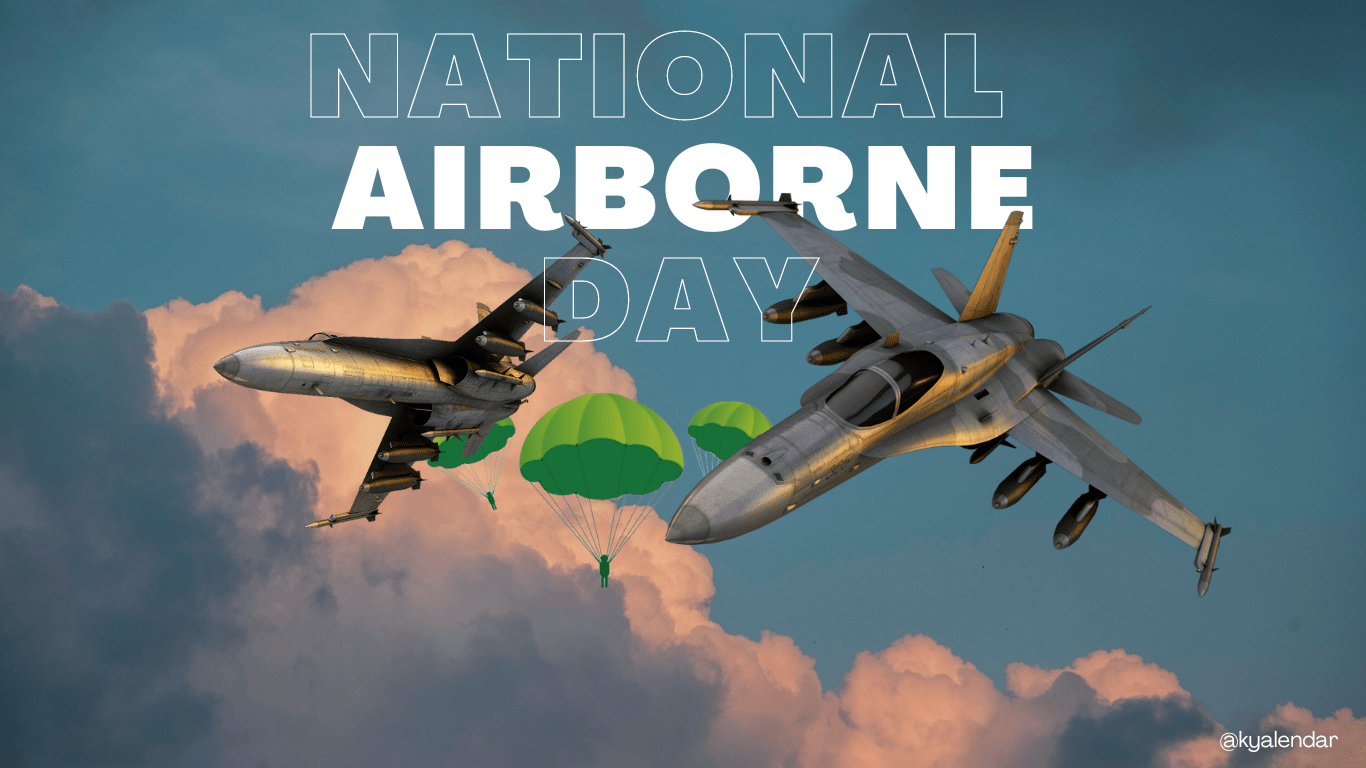
- This event has passed.
National Airborne Day
August 16

National Airborne Day is observed annually on August 16th to honour the achievements and sacrifices of the United States Army’s airborne forces. Established to recognise the bravery, skill, and dedication of these elite soldiers, National Airborne Day celebrates the history and legacy of America’s paratroopers and airborne units, who have played a crucial role in numerous military operations since their inception.
Historical Background:
National Airborne Day was established by President George W. Bush in 2001 to commemorate the first official U.S. Army parachute jump on August 16, 1940. This historic event took place at Fort Benning, Georgia, and marked the beginning of the U.S. military’s airborne capabilities.
The concept of airborne forces was relatively new at the time, inspired by the success of similar units in other countries, particularly Germany. The U.S. Army sought to develop its own airborne units, capable of being deployed behind enemy lines via parachutes to conduct surprise assaults, disrupt enemy operations, and seize key objectives.
The initial test jump in 1940 involved a small group of soldiers, known as the Parachute Test Platoon, who volunteered to take part in the experimental program. The success of this jump led to the rapid expansion of the airborne program, with the formation of the 82nd and 101st Airborne Divisions. These units went on to become some of the most celebrated and effective forces in the U.S. military.
During World War II, airborne units played a pivotal role in several key operations, including the D-Day invasion of Normandy, Operation Market Garden in the Netherlands, and the Battle of the Bulge. Their ability to deploy quickly and operate in challenging environments made them invaluable assets on the battlefield. The bravery and effectiveness of the airborne troops earned them a reputation as some of the most elite soldiers in the world.
Since World War II, airborne forces have continued to be a vital component of U.S. military operations, participating in conflicts in Korea, Vietnam, the Middle East, and other regions around the globe. National Airborne Day serves as a tribute to the courage, dedication, and sacrifices of these soldiers, past and present.
Significance:
National Airborne Day is significant for several reasons:
1. Honouring Military Tradition: The day honours the rich tradition of airborne forces in the U.S. Army, celebrating their history and the critical role they have played in defending the nation.
2. Recognition of Bravery: Paratroopers and airborne soldiers undergo rigorous training and face extreme dangers in their missions. National Airborne Day recognises the bravery and sacrifice of these individuals, many of whom have made the ultimate sacrifice in service to their country.
3. Promotion of Military Heritage: By celebrating National Airborne Day, the public is reminded of the importance of airborne forces in the broader context of U.S. military history. The day helps to preserve the legacy of these elite units for future generations.
4. Inspiration for Service: National Airborne Day can serve as an inspiration for young people considering military service, showcasing the honour and respect afforded to those who serve in airborne units.
How National Airborne Day is Celebrated:
1. Ceremonies and Events: Military bases, particularly those with airborne units, often host ceremonies and events to mark National Airborne Day. These may include parades, wreath-laying ceremonies, and speeches by military leaders. Fort Benning, where the first parachute jump took place, often holds a special event to commemorate the day.
2. Parachute Demonstrations: Airborne units may conduct parachute demonstrations on National Airborne Day, showcasing their skills and the precision required for successful airborne operations. These demonstrations are often open to the public and serve as a powerful reminder of the capabilities of airborne forces.
3. Recognition of Veterans: National Airborne Day is an opportunity to recognise and honour veterans of airborne units. Communities and veterans’ organisations may host events or gatherings to celebrate the service of these individuals, providing them with the recognition they deserve.
4. Educational Programs: Some schools and educational institutions use National Airborne Day as an opportunity to teach students about the history and importance of airborne forces. This may include lessons on World War II, the evolution of military tactics, and the role of airborne units in modern warfare.
5. Social Media and Awareness: Military organisations and supporters often use social media to raise awareness about National Airborne Day. Posts may include historical facts, stories of heroism, and tributes to airborne soldiers, helping to spread the significance of the day to a wider audience.
Conclusion:
National Airborne Day is a day of reflection, honour, and pride for the United States military and the nation as a whole. It serves as a reminder of the courage, dedication, and skill of the U.S. Army’s airborne forces, who have played a critical role in many of the most significant military operations in American history.
Through ceremonies, demonstrations, and educational efforts, National Airborne Day ensures that the legacy of these elite soldiers is remembered and celebrated. It is a day to honour those who have served, those who continue to serve, and those who have given their lives in the line of duty. National Airborne Day stands as a testament to the enduring spirit and commitment of the U.S. Army’s airborne forces, inspiring future generations to continue the tradition of excellence in military service.